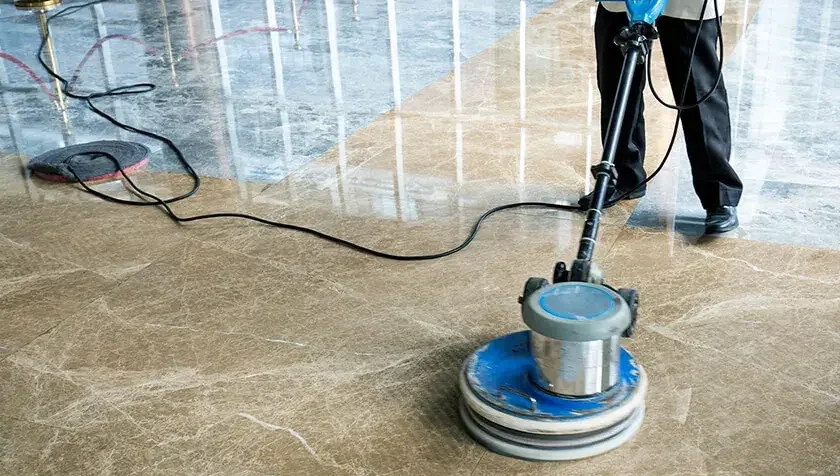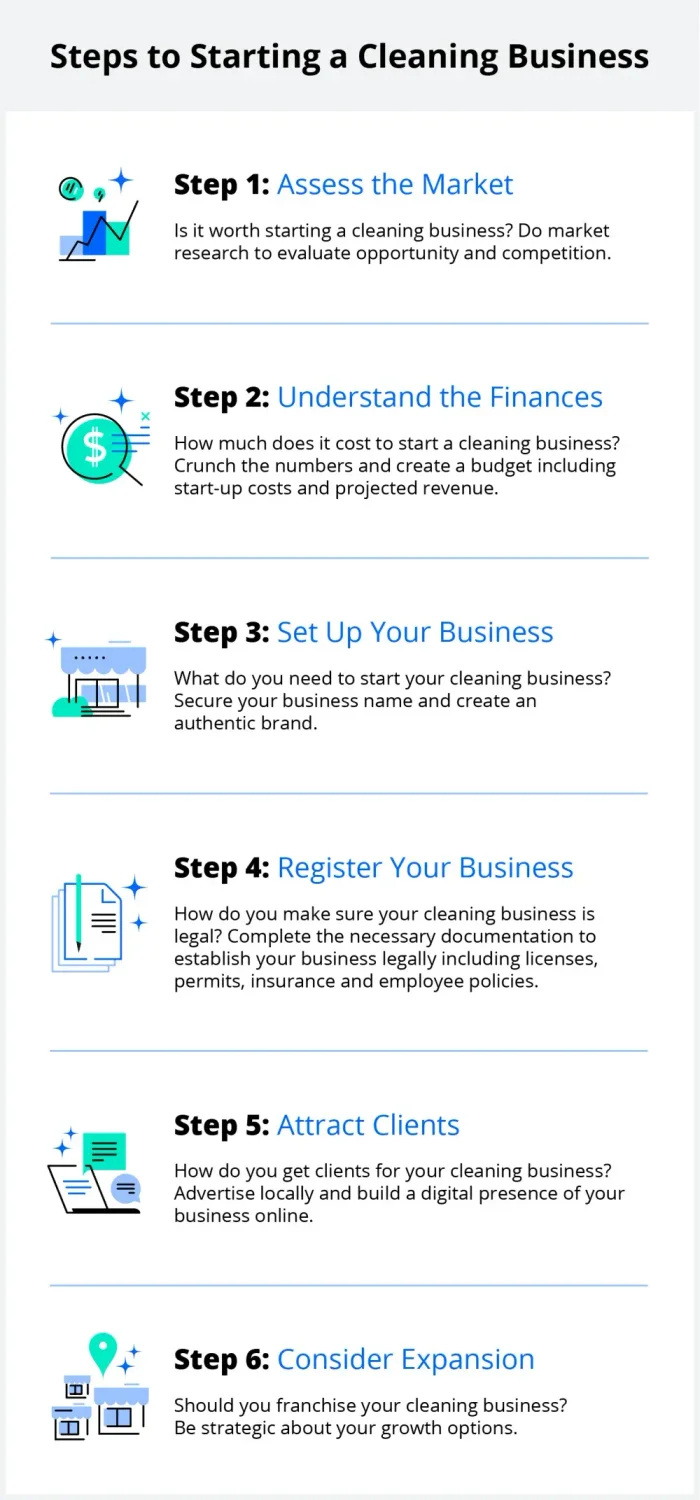If you're a perfectionist type who can't stand the sight of a thumbprint on a glass, you might consider opening your own cleaning business from scratch.
Be cautioned that starting a cleaning business is no small feat. Cleaning may be widely known as an everyday task, but there's a big difference between a chore and starting a business. However, your cleaning business can lead to rewarding payouts if done right.

Below, we walk you through step-by-step how to do it right. You'll learn what's necessary to create a successful and long-lasting cleaning business.
Step 1: Assess the market. Is it worth starting a cleaning business?
A polar bear wouldn't survive in the Bahamas, just as a tropical bird wouldn't last in the Arctic. Businesses are like that, too. One key business principle is finding a place where your idea can not only survive but thrive—which means doing in-depth market research.
To conduct market research in the cleaning industry, you'll need to assess your environment, understand if there are other competitors in your space, and decide whether you'd do better as a residential or a commercial cleaning company.
- Do your market research. An essential first step to starting your cleaning business is understanding the industry. Specifically, you'll want to conduct market research to see how concentrated your area is. Are there other cleaning companies already in your town? If so, think about what added value your company can bring to outperform the competition. Maybe it's a strong customer loyalty program with irresistible incentives, or you use highly effective products and equipment. Doing research is a way to evaluate the competition and ideate what your cleaning company's unique value can bring. You'll also want to become informed about the cleaning industry in general. How to effectively clean a house, how many houses you should look to clean a week to make a profit, and how many employees you'll need are good starter questions to develop the background knowledge you need to get started.
- Decide whether you want to be residential or commercial. Cleaning can be done at a residency or for a business, so before you move forward, you'll want to decide which is better suited for you. Commercial cleaning, or cleaning for a business, includes waste clean-up, hazardous material cleaning, and heavy cleaning. Often, commercial cleaning requires higher startup costs and more training because you might be working with chemicals and hazards. However, commercial companies have long-lasting customers who usually pay more. Alternatively, you can clean for residential properties. These would be homes or apartments, and the cleaning tends to be less extensive than commercial establishments.
Step 2: Understand the finances. How much does it cost to start a cleaning business?
Once you sweep through step one, it's time to understand the numbers. Luckily, the costs related to a cleaning business are far from messy. Here are three considerations you should take into account when it comes to financing your cleaning business:
- Figure out startup costs. Luckily, starting a cleaning business doesn't require a lot of upfront spending. When determining what you'll need for startup costs, consider how aggressive you want to be in terms of your workload. Will you be cleaning three houses a day? Or are you looking to instead clean three houses a week? The answers to these questions will help dictate how much cleaning equipment you need. Other startup costs might include money for transportation and further supplies. It's also smart to also have an emergency fund just in case any damage occurs.
- Create a budget. Once you know how much money you'll need to get the equipment for your business, it's time to create a budget. Look into the average rate of a house cleaner in your neighborhood. According to Freshbooks, the average hourly rate in the U.S. is $25 to $90 per cleaner. While the going rate may vary depending on the size of the house, the area's socioeconomic status, and the quality of work you do, you can use these numbers to figure out what your annual revenue will be and budget that accordingly.
- Look into financing options. Relative to starting a cutting-edge technology company or high-fashion retail brand, starting your cleaning business doesn't come at a huge cost. All you'll need is transportation money and cleaning equipment to start off, which you can get by independently bootstrapping. However, if you need to raise capital, figure out the best type of investor for your startup. Often, an investor may be a close friend or family member willing to cover your startup expenses until you can make enough profit to pay them back. Once you begin turning a profit consistently, it's a good idea to consider hiring a bookkeeper to take care of your expense tracking and accounting matters.
Step 3: Set up your business. What do I need to start my cleaning business?
You've assessed the local landscape for your business and crunched the numbers. Now, it's time to do some essential things to actually set up your business. To take your idea to a real business, read through these considerations.
- Invest in good equipment. You've budgeted for the equipment, and now it's time to go and buy your cleaning supplies. Make sure to keep a spreadsheet to track your spending and inventory. You'll also want to research every product you purchase to ensure it's up to your quality standards. Ensuring quality is especially important with cleaning products as you don't want to introduce any harmful chemicals or toxins into a client's house.
- Create an authentic brand identity. Next, you'll want to create your brand—an important yet undervalued part of starting a cleaning business. You want to be a cool, sleek cleaning company people want to dial up just by looking at the logo. The difference between an authentic brand and a generic one can make or break your success, especially if you're working in a highly concentrated area with a lot of competition. In fact, 86% of consumers say that authenticity is a key factor when deciding what brands they like and support, according to Oberlo. To create your brand, start by selecting a business name, trademarking it, and designing a logo. Be sure to check the availability of your business name.
- Make a one-page business plan. You've done most of the leg-work for a comprehensive business plan by completing the above steps. Now, it's time to compile all that information into a one-page business plan that you can refer back to if you need operational guidance or pass along to potential investors. Include your business name, logo, mission statement, budget, start-up expenses, market research, and any thoughts you have for how you want to expand your business. Create a one-page plan for now, as you can always update this plan as your business grows.
Step 4: Register your business. How do I make sure my cleaning business is legal?
Theoretically, if you've completed all the above steps, you should be all set to go out and secure clients. However, under state laws, your business might be in legal jeopardy if you don't legitimize it. You need to report your income as a business, which means declaring yourself as a legal entity. Here are some necessary legal considerations you need to attend to before getting down to business:
- Legally form your business. To start doing business, you'll want to think about what legal business type your company should take. One option is forming an LLC. Unlike forming a sole proprietorship, choosing to form a limited liability company decreases your personal liability when it comes to things like business debts, making them a good option for those looking to start a business. To do so, you'll need to file LLC papers once you choose a business name and check the domain availability of the name.
- Get the proper insurance for your company. Since you're working with clients and likely will be hiring employees, you'll need to take care of insurance. Typically, a cleaning business needs liability insurance, house cleaning bonding insurance, workers compensation insurance, property damage insurance and business transportation insurance. However, these plans are dependent on many unique factors pertaining to your business. Ask these questions to get a better understanding of your business's insurance needs.
- Establish employee policies. As you grow and hire employees, you'll need to establish the appropriate policies to make sure both the business and it's workers are protected. To begin establishing employee policies, you'll need to create an assortment of documentation such as employee hiring and termination paperwork, vacation and sick policies, and pay contracts. Startups hiring their first employees need to cross off a long list of legal tasks and establish lasting systems for the business. However, once these items are taking care of you can scale your business easily.
Step 5: Attract clients. How do I get clients for my cleaning business?
Now that you're legally a business owner, it's time to start getting clients to make your business profitable. For cleaning businesses, you'll want to advertise and market locally. Here's some fail-proof ways to land your first few clients.
- Advertise locally. Think about things that everyone in your region either sees. It may be through the online newspaper, the local TV station or a billboard next to a main street that's highly trafficked. Identify the ideal local hot spot and seek to place an advertisement there. Advertising locally can cost a pretty penny, so before you pay up consult your budget and see if you have the financial bandwidth to advertise.
- Market your business online. Like most things these days, marketing can be effectively done online and can be cheaper than advertising. A good starting block is to get your business established with Google My Business, which will list your company on Google for any people searching online. You'll also want to understand your customers and where they spend their time online. If you want to work for single-family residences, consider marketing on Facebook as that caters to a more millennial audience.
- Create a referral program. Once you establish one or two clients, provide those customers with incentives if they refer your service to friends. For example, offer them two free house cleans for every two people they refer your business to. Creating a referral program is an easy and sure way to go from a handful of clients to a roster of them.
Step 6: Consider expansion. Should I franchise my cleaning business?
Depending on your ambitions, you might want to take your cleaning business to the next level once you establish some regular customers. Of course, there's advantages and disadvantages to expanding your business. Yes, there is more opportunity for making money, but it also could be a risk if you can't afford a larger client load. So, before expanding, think about if you're financially able. And if it's the case you are, here are some ways to level-up your cleaning business:
- Think about franchising. If you've tapped your local market, consider franchising and opening up offices in other regions. Opening and operating a franchise is a multi-step process that involves establishing a relationship, legally and personally, with a person who will become the owner of the new franchise. You'll become the operator and be responsible for the business as a whole, while the owner will manage the particular branch of the business. Franchising can be a great way to expand into new markets. However, it involves a lot of planning, so before you jump in familiarize yourself with franchising.
- Hire more employees. If your workload is outpacing the rate you can clean, consider bringing on more employees. Quality is important when it comes to cleaning, so you don't want to compensate that for the sake of efficiency. Hiring more employees will allow you to take ample time to clean to your standard while bringing on more clients.
Below, we've compiled these steps into an easy-to-use checklist:

Starting a business is a huge task, but it can also be hugely rewarding, especially in a line of work as laborious as cleaning. Take pride in the process and don't get too defeated if you hit an obstacle. Just as a messy room looks impossible at first to make nice, so does taking on a business. It seems too daunting, but by starting and slowly making progress you'll see how quickly you can transform it into something wonderful.

